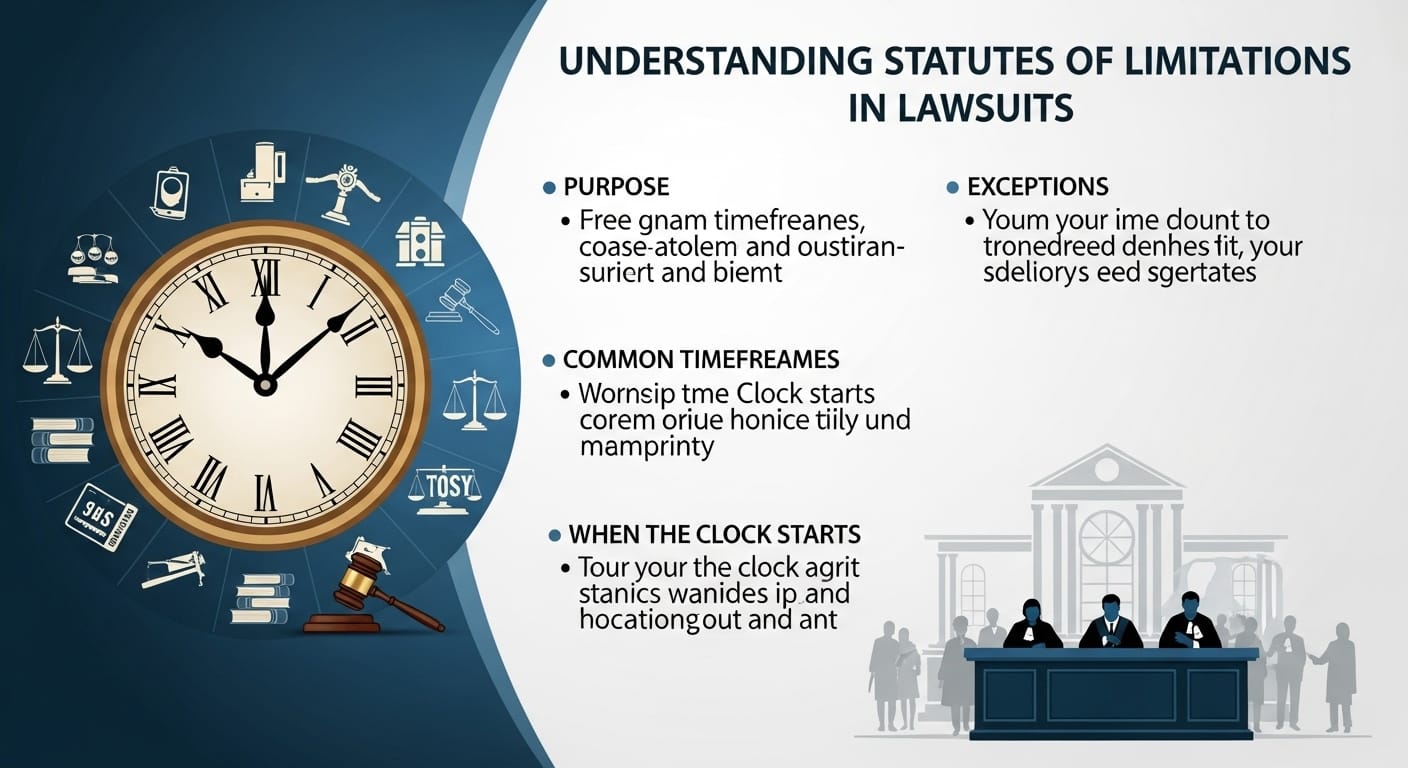Ah, the statute of limitations. It sounds like something you’d hear at a fancy dinner party where everyone is wearing bow ties and discussing their stock portfolios.
But fear not! This legal concept is less about high society and more about ensuring that justice doesn’t take an eternity to serve—kind of like waiting for your favorite pizza delivery when you’re starving.
Imagine this: You’ve just discovered that your neighbor’s tree has been dropping acorns on your car for years, and you’re ready to sue. But wait! What if I told you there’s a time limit on how long you can wait before taking action?
That’s where statutes of limitations come into play, and trust me, understanding them could save you from a lot of frustration—and possibly some regrettable decisions.
Please Note: This post may contain affiliate links. If you click one of them, we may receive a commission at no extra cost to you. As an Amazon Associate, I earn from qualifying purchases.

Top Takeaways and Key Concepts
Statutes of limitations set the maximum time you can file a lawsuit after an event.
Different case types have different timelines, so always check state-specific laws.
Exceptions, called tolling, can pause the clock for minors or mentally incapacitated individuals.
Missing the deadline usually prevents filing a claim, with very limited exceptions.
Understanding these timelines early ensures your right to seek justice is preserved.
Summary of This Article
The article explains statutes of limitations, which are time limits for filing lawsuits. These deadlines vary by case type, such as personal injury, breach of contract, property damage, or fraud. Exceptions like tolling allow additional time for minors or those mentally incapacitated. Missing the statute of limitations typically prevents pursuing a claim, making awareness critical. Staying informed about the relevant timelines ensures individuals can take timely legal action and protect their rights.
What Are Statutes of Limitations?

To kick things off, let’s break down what exactly a statute of limitations is. In simple terms, it’s the law that sets the maximum time period within which you can file a lawsuit after an event occurs.
Think of it as the “expiration date” on your legal rights—once it passes, poof! Your chance to seek justice vanishes faster than my motivation to go to the gym after dessert.
Different types of cases have different time limits. For instance, personal injury claims might give you two or three years (depending on where you live), while breach of contract cases could offer up to six years.
So, whether you’re dealing with a slip-and-fall incident or trying to get back money owed by Uncle Bob for that ill-fated investment in Beanie Babies, knowing these timelines is crucial!
Why Do They Exist?
Now, why do we even have these statutes? Well, think about it: evidence can disappear over time. Memories fade quicker than my recollection of last week’s lunch menu.
Witnesses move away or forget key details (like how they were convinced they saw Bigfoot). The longer we wait to file lawsuits, the harder it becomes for courts to make fair decisions based on solid evidence.
Interestingly enough, statutes also help prevent endless legal disputes over old grievances. Imagine if people could sue over events from decades ago; we’d be drowning in court cases about who borrowed whose lawnmower back in 1995!
Keeping things timely helps maintain order in our legal system—and probably keeps lawyers from going completely bonkers.
How Do They Vary by Case Type?
As I mentioned earlier, different case types come with different deadlines—but what does that actually look like? Let’s take a peek behind the curtain:
1. Personal Injury: Generally ranges from one to six years depending on your state.
2. Breach of Contract: Typically around three to six years.
3. Property Damage: Usually falls under similar timelines as personal injury claims.
4. Fraud Cases: These often have longer periods because victims may not discover fraud until later—think sneaky relatives “borrowing” money without asking.
By the way, always check local laws because these periods can vary widely between states! If you’re unsure about your specific situation—or if Aunt Edna has her eye on your inheritance—it’s best to consult with an attorney who knows their stuff.
Tolling Exceptions: When Time Stands Still
Okay, here comes the twist—the clock doesn’t always tick steadily! There are situations called “tolling exceptions” where the statute’s countdown pauses temporarily. For example:
– If you’re underage when the incident occurs (sorry kids!), many states allow extra time once you reach adulthood.
– Similarly, if someone involved was mentally incapacitated during part of that timeline—well then again—you get some leeway!
These exceptions exist so that life circumstances don’t unfairly disadvantage certain individuals seeking justice—which sounds pretty reasonable when you think about it!
What Happens If You Miss It?
So, let’s say you’ve missed your window—oops! Can anything be done? Unfortunately…probably not much unless there are extraordinary circumstances at play (like discovering new evidence).
Courts typically won’t entertain late filings because they rely heavily on those established timelines to keep things running smoothly.
This means if you miss out due to procrastination or lackadaisical planning (hey—we’ve all been there), chances are you’ll find yourself staring at closed doors instead of open ones filled with potential compensation opportunities.
Conclusion: Don’t Let Time Slip Away
In conclusion (and spoiler alert!), understanding statutes of limitations is essential for anyone considering filing a lawsuit—even if it’s against that neighbor with questionable taste in garden decor.
Knowing these rules helps ensure that your right to seek justice remains intact rather than fading away like yesterday’s leftovers!
So remember: stay informed about timelines relevant to YOUR case type and don’t hesitate—take action before it’s too late!
Suggested Resources:
Understanding Statute of Limitations
https://www.nolo.com/legal-encyclopedia/understanding-statute-limitations-29959.html
Statute Of Limitations by State
https://www.statuteoflimitations.net
What Is a Statute of Limitations?
https://www.law.cornell.edu/wex/statute_of_limitations
Frequently Asked Questions
What is a statute of limitations?
A statute of limitations is the legal deadline for filing a lawsuit after an event. Once the time expires, you typically lose the right to pursue your claim in court.
Why do statutes of limitations exist?
They ensure fairness by preventing outdated claims. Over time, evidence fades, witnesses forget details, and it becomes harder for courts to make accurate decisions.
How long do statutes of limitations last?
The duration varies by case type and state. For example, personal injury claims may allow two to three years, while contract disputes might allow up to six years.
What are tolling exceptions?
Tolling exceptions pause or extend the statute of limitations for specific reasons, such as when a person is underage or mentally incapacitated during the standard period.
What happens if I miss the statute of limitations deadline?
Missing the deadline usually means your case will be dismissed. Only rare circumstances, such as newly discovered evidence, might allow reconsideration.
Do statutes of limitations differ between states?
Yes. Each state sets its own timeframes depending on the type of case. Always review your state’s specific laws or consult an attorney for accurate guidance.
Why is it important to know your statute of limitations?
Understanding these time limits ensures you take legal action promptly and preserve your right to compensation or justice before the deadline passes.

Kevin Collier is a legal expert passionate about simplifying complex legal concepts for everyday individuals. With a focus on providing clear, practical information, he covers a wide range of topics, including rights, responsibilities, and legal procedures. Kevin aims to empower readers with the knowledge they need to navigate the legal landscape confidently, ensuring they can make informed decisions regarding their legal matters. Through insightful articles and easy-to-understand resources, he helps demystify the law, making it accessible to all.










